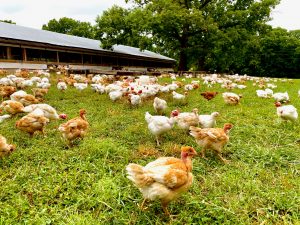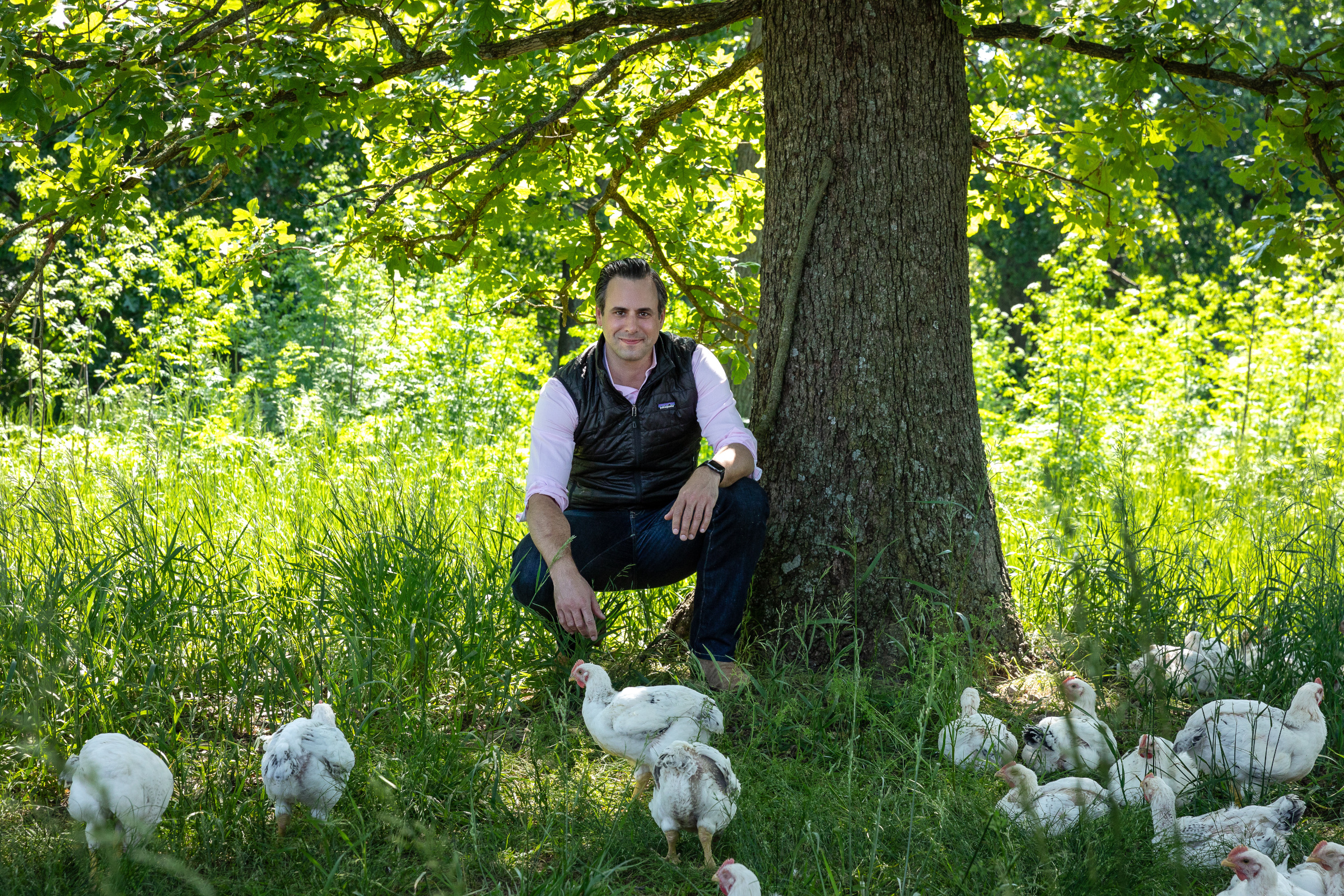As founder and COO of popular meal-kit delivery service Blue Apron, Matthew Wadiak saw problems in the chicken industry with its factory farmed chickens raised in inhumane, unhealthy conditions. Beyond that he learned that the poultry industry is highly consolidated, even more than the beef and pork industries.
“Most of the birds from every company in America come from two large consolidated businesses: Aviagen and Cobb,” he says. “Nobody’s heard of these guys, and every company in America is purchasing their chicken genetics from one of those two companies.”
So Wadiak decided to create another option. He launched a company, Cooks Venture, to provide regeneratively pasture-raised heirloom broiler chickens that are better for people and the planet.
“We are the alternative to the industrial-bred and factory-farmed chickens that dominate the broiler chicken industry today,” he says.
Most chickens come from two breeds
Cooks Venture operates facilities in Oklahoma and Arkansas, which is also the location of their 800-acre farm where they pasture raise their heirloom chickens. A vertically integrated poultry producer, they breed, raise, process, and then ship their chickens to consumers nationwide.
Aviagen and Cobb produce the two main chicken breeds sold to consumers today: Aviagen’s Ross 308 and Cobb’s Cobb 500. According to Wadiak, most of the chickens people eat in the U.S.—even organic—come from those two breeds, making them the “iPhone and Android” of the poultry industry, as one article described them. There may be many food brands that sell broiler chickens, but behind the label there’s a 90% chance that consumers will get either a Ross 308 or a Cobb 500.
“No matter what the chicken is, you’re buying poultry from one of those two businesses,” Wadiak says.
“More tender, succulent, and flavorful eating experience”
The genetics team at Cooks Venture has worked for more than a decade to bring a better chicken to market as an alternative to the industrial chicken monopoly. They’ve bred a chicken to be raised on pasture and fed a diverse, more nutritious diet that delivers better taste, which Wadiak values as a chef.
Their heirloom chicken, the Pioneer, is the result of three-way cross breeding of a “Naked Neck Buff” heirloom chicken, a Delaware breed, and a chicken variety raised by the grandfather of Wadiak’s business partner, Blake Evans.
Because of the cross with the Naked Neck Buff, the Pioneer chickens have no feathers on their necks, allowing them to tolerate heat more.
“Our birds can go outside in the summer and be more comfortable,” Wadiak says.

Cooks Venture’s pasture raised chickens
The Pioneer birds also have longer legs, another advantage. By contrast, the Aviagen and Cobb chickens are bred for increased breast meat, which results in birds that are heavier and bowlegged, barely able to get off the ground. This makes them susceptible to dirt and disease.
The culinary characteristics of Cooks Venture chickens are “vastly different” from a conventional bird, which have large muscles and are bred for increased breast meat, according to Wadiak.
“If you cook one (conventional chicken), it’s stringy, and that’s because the muscle cells are so big,” he says. “When you have finer muscle structures, like in our bird, it’s a more tender, succulent, and flavorful eating experience.”
“Regenerative agriculture is the same as organic systems agriculture”
Cooks Venture has several certifications including Non-GMO Project verification, Animal Welfare Certified-Pasture Raised, and Certified Humane.
The company recently announced a partnership with Food In Depth, which tests for the presence of antibiotics and other adulterants. As a result, Cooks Venture has become the first company in America to test for—and validate the absence of—synthetic inputs such as antibiotics, whose overuse has become a major problem in meat production because of the threat of antibiotic resistant bacteria.
We know that we’re 100% input-free in terms of synthetics, and we want to be able to prove that. The public should not have to go to the grocery store and question what they’re feeding their families,” Wadiak says.
Cooks Venture hasn’t sought organic certification because organic poultry production in the U.S. is dependent on imported corn and soybeans of sometimes questionable organic integrity.
“I refuse to go with the USDA organic certification with imported grains. Fifty percent of that (imported) stuff won’t pass mass spectrometer testing to validate it,” Wadiak says.
Still, Wadiak equates organic agriculture with regenerative. “Regenerative agriculture is really the same as organic systems agriculture, not to be confused with the organic label. People who are growing things in organic systems are supporting regenerative ag.”
Wadiak defines regenerative agriculture as making improvements to the land through four strategies: building soil health, increasing biodiversity, using integrated pest management methods instead of synthetic pesticides, and applying natural fertilizers instead of petrochemical sources.
“Audacity to challenge Big Chicken”
Cooks Venture sells its chickens direct to consumers online as well as on e-commerce websites such as Thrive Market and Fresh Direct. They are also sold in retail stores across the country such as New Seasons Market, New Leaf Community Markets in California and Whole Foods Market.
“We have a bunch of different partners,” Wadiak says. “We’re a medium sized operation, which you have to be to make an impact and do all the work we’re doing.”
Cooks Venture recently raised $10 million in investment capital. One of the investors is John Roulac, founder of Nutiva organic food company and executive producer of the new film about regenerative agriculture, Kiss the Ground.
“Matthew had the plan and audacity to challenge ‘Big Chicken,’ ” Roulac says. “He is also interested in working with farmers supplying feed to measure soil health and to bring on people focused on regenerative agriculture agronomy.”
Diversified feed supply that contributes to soil health
Regenerative agriculture with its emphasis on soil health is a major trend today, and Cooks Venture is pioneering the use of regenerative methods in larger scale poultry production.
But Cooks Venture isn’t the only poultry producer using regenerative methods. The Main Street Project led by Reginald Haslett-Marroquin has developed a system of “poultry-centered” regenerative production for smaller scale farms that he aims to replicate worldwide. So far, farms in Minnesota, South Dakota, Nebraska, Guatemala, and Mexico are using the system.
In industrial—and even organic—poultry production chickens are raised primarily on corn, soybeans, and soybean meal. Nearly 40% of U.S. corn production is used for animal feed with 9% of that fed to chickens.
Wadiak says that represents a major opportunity to change agriculture from industrial monocropping with its reliance on chemical pesticides and fertilizers and genetically modified crops.
“If we could convert that land over to organic and regenerative systems, that would create a massive impact to increase organic matter in soil, biomass, and carbon sequestration,” he says.
The challenge is to create a diversified feed supply with other grains such as wheat and oats that chickens can digest, and one that contributes to building soil health through cover crops and diverse crop rotations.
“You have to build the market (for alternative feed crops) and breed a better bird that can digest red winter wheat, sorghum, sunflower, and other crops,” Wadiak says. “What we’re looking for in our breeding program is a symbiosis between the animal’s ability to digest a feed mix, and then utilize that in conjunction with soil health.”
Cooks Venture feeds its chickens a Non-GMO Project Verified feed ration that includes corn but also micronutrients not available in corn and soybeans. Majestic Milling, a Missouri-based producer of non-GMO verified and organic feed, supplies the feed.
Cooks Venture’s regenerative feed manager is also working with farmers to grow more diversified feed crops.
“Oats is on our list, as are many different kinds of wheat depending on the geography. There are a lot of options,” Wadiak says.
Vision for a better agricultural system
Cooks Venture is literally going against the grain in chicken production and forging its own regenerative path. It’s not an easy path but Wadiak thinks his vision for a better, healthier agriculture system has come at the right time.
We are working hard to drive the agricultural industry toward greater biodiversity and breed diversity. We want to provide our customers with a truly transparent and better choice that they can feel good about and that’s healthier for them, for the planet, and the animals that we’re growing for food.”









